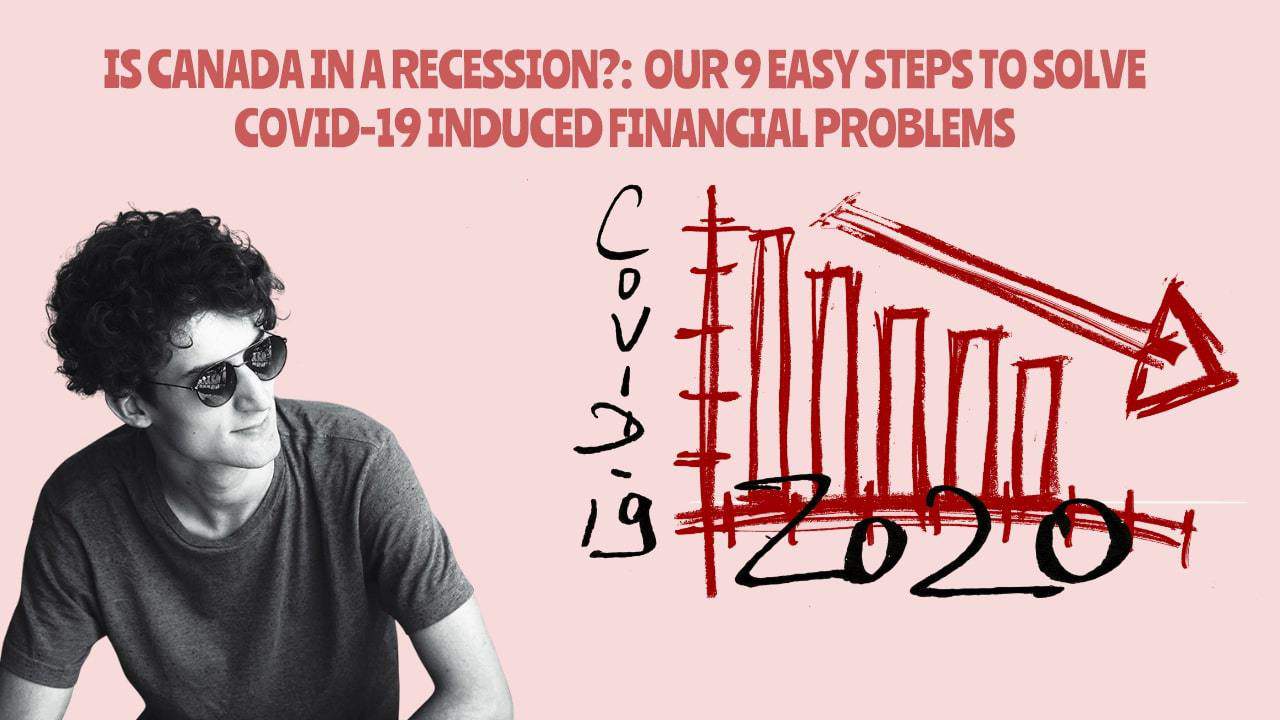One question that people are searching online for answers is: Is Canada in a recession? Last month I wrote a blog titled Canada in recession: Will the economy fall into a great depression? In that blog, I described the views of Nouriel Roubini is a world-known economist and a professor of economics at New York University’s Stern School of Business. He has some stark current thoughts on just how bad the Canadian economy can go. I invite you to again read that blog to see what his thoughts are.
That blog accepted the signals that Canada is in a recession. The purpose of this Brandon’s Blog is to take a step back and answer the question: Is Canada in a recession?
Is Canada in a recession? What is a recession?
To begin to answer is Canada in a recession, we first need to understand what a recession is.
A recession is a short-term period of overall economic decline. Economies go via cycles, which implies there are periods of growth as well as durations of decline. The COVID-19 pandemic has actually thrust our economic climate into a decrease, a lot like just how a considerable, unanticipated expense can upend your own household budget plan.
The federal government identifies when our economy has actually entered a recession and when it has left by measuring key economic signals. These signs are sensitive to what happens locally and internationally. They include, for circumstances, declines in various industry sectors, agriculture or manufacturing, and also disruptions to international trade.
The C.D. Howe council defines a recession as a pronounced, persistent, and pervasive decline in total economic activity. It considers both GDP and employment as its major rulers. Is Canada in a recession? It stated that Canada is formally in an economic crisis and recession.
What did some economists forecast about is Canada in a recession
Economists were checking out financial indicators of the health of the Canadian economy near the end of 2019 and very early in 2020 to try and forecast the future. So, what were economists saying about is Canada in a recession?
What some economic experts were predicting prior to the coronavirus pandemic was that they really did not assume we would see one this year. However, on the other hand, last October David Rosenberg, chief economist at Gluskin Sheff & Associates, assumed there would certainly be an 80% chance of an economic downturn coming to Canada this year.
The complete level of its economic impact will certainly not be known for some time. It seems clear to economists that the United States will certainly go into an economic downturn in 2020 if it hasn’t already. Since 1970, Canada has experienced economic crises at roughly the very same time as the USA, showing the interconnectedness of the two economies. So it appears that all of North America is in a recession.
How bad will Canada’s COVID-19 recession be?
Canada is only now seeing the tip of the economic iceberg from COVID-19. It is clear that its economic effect will be like nothing seen since the Great Depression. Economists state the overview for employment and the economic climate will be stark. The only silver lining may be that the deepness and suddenness of the decrease might offer hope for a fast rebound.
As I previously reported, Dr. Roubini thinks there are pressures that not only would make is Canada in a recession, but it could go into a depression! His view is that there is going to be a U-shape recuperation due to the fact that this is an international shock. Both households and businesses will need to invest less and save more. Precautionary savings are most likely to go higher. Income is most likely to be lower. This will convert into much less business capital spending. He claims there will certainly be a worldwide investment slump due to a global savings excess.
How long will this is Canada in a recession last?
The rapid spread of coronavirus led to unprecedented personal, the social, and economic impact that caught the world largely unprepared. Although the government of Canada responded decisively with programs and grants to lessen the economic devastation, the recovery period remains to be seen. And by most indicators, this downturn is looking like a long and steep uphill climb.
If we’re looking specifically at negative growth, then economists anticipate that this trend won’t continue for long. There are 2 reasons:
- Lockdown mandated by the government. Whatever was closed down by government mandate which takes place much faster than a shutdown due to economic issues.
- Government bailouts. The government is supporting the whole economy. Yes, we’ll need to pay back the government in taxes eventually yet that can only occur when the economy is recovering. This suggests that economic growth will certainly be slower.
Parliament budget officer Yves Giroux believes that the Canadian deficit this year will strike $256 billion, consisting of a 6.8% decline in economic development, the most awful showing since the 1981-1982 economic recession.
Is Canada in a recession? Are there any predictors of a recession recovery?
Indicators like stagnant salaries, low home financial savings, as well as high consumer financial debt, don’t predict economic crises, yet they do forecast just how challenging the healing will be when an economic downturn hits. Below are some signs and symptoms that can indicate a recession:
- the surge in joblessness;
- an increase in bankruptcies;
- defaults or repossessions;
- the falling rate of interest;
- reduced consumer spending;
- decreased consumer confidence; and
- falling asset prices.
A healthy and balanced labour market as well as a turnaround in the housing sector helped the Canadian economy expand at a modest rate in 2019. This supports the contention that in order to come out of an economic downturn, companies and consumers need to feel confident to invest and spend.
What can you do when is Canada in a recession
If you believe the answer to the question is Canada in a recession is yes, after that there are several things that you can do. I have written on these problems before under several headings such as financial literacy, household debt and the benefits of having an emergency savings fund on hand in case of, well, an emergency situation.
You can’t regulate the country’s economic climate, yet you can control your very own. Every person requires to take a look at:
- Using this time to examine your overall household budget and figure out some practical yet difficult goals for your cash.
- This is the time to live according to your emergency situation budget and look at what your typical spending plan will certainly resemble once you are back to work.
- Consider your typical budget based upon what it looked like before COVID-19 hit and the insights you’ve gotten around your spending behaviours since you’re living more frugally.
- Making a plan to eliminate credit card debt. Try to find a no or extremely reduced rate of interest balance transfer charge card to transfer the balance to if you have some credit card financial debt lingering around.
- A strategy to include a savings element in your family budget will aid to shield you when you face a reduction or a full loss of your earnings.
- Dealing with the pandemic as a wake-up call to recession-proof your funds. If your income was impacted by the pandemic, what length of time could you have survived had the government, banks and other financial institutions and different corporations not actioned in with procedures to get cash back into your wallet through deferrals?
- Can you work at a couple of jobs that amount to providing you with a full-time revenue? This might first take some efficient networking before you can discover the appropriate mix of work.
- Have an emergency fund all set up. It will go a long way to helping you weather a recession.
- No matter your current scenario, the very best way to recession-proof you and your family is with an emergency savings account.
In the post-COVID years, there is a likelihood that lenders will be stingier with exactly how much cash they loan to customers. So guarantee that your budget permits constant debt repayment when you resume a stable income that resembles your pre-coronavirus income level.
That is exactly why it is crucial to focus on your financial situation now and take steps to guarantee your long-term personal financial stability.
Is Canada in a recession summary
It certainly feels that way. I hope you found this is Canada in a recession Brandon’s Blog informative. The Ira Smith Team family hopes that you and your family members are remaining secure, healthy and well-balanced. Our hearts go out to every person that has been affected either via misfortune or inconvenience.
We all must help each other to stop the spread of the coronavirus. Social distancing and self-quarantining are sacrifices that are not optional. Families are literally separated from each other. We look forward to the time when life can return to something near to typical and we can all be together once again.
Ira Smith Trustee & Receiver Inc. has constantly used clean, safe and secure ways in our professional firm and we continue to do so.
Income, revenue and cash flow shortages are critical issues facing entrepreneurs, their companies and individual Canadians. This is especially true these days.
If anyone needs our assistance for debt relief Canada COVID-19, or you just need some answers for questions that are bothering you, feel confident that Ira or Brandon can still assist you. Telephone consultations and/or virtual conferences are readily available for anyone feeling the need to discuss their personal or company situation.
The Ira Smith Trustee Team is absolutely operational and Ira, in addition to Brandon Smith, is readily available for a telephone consultation or video meeting.








